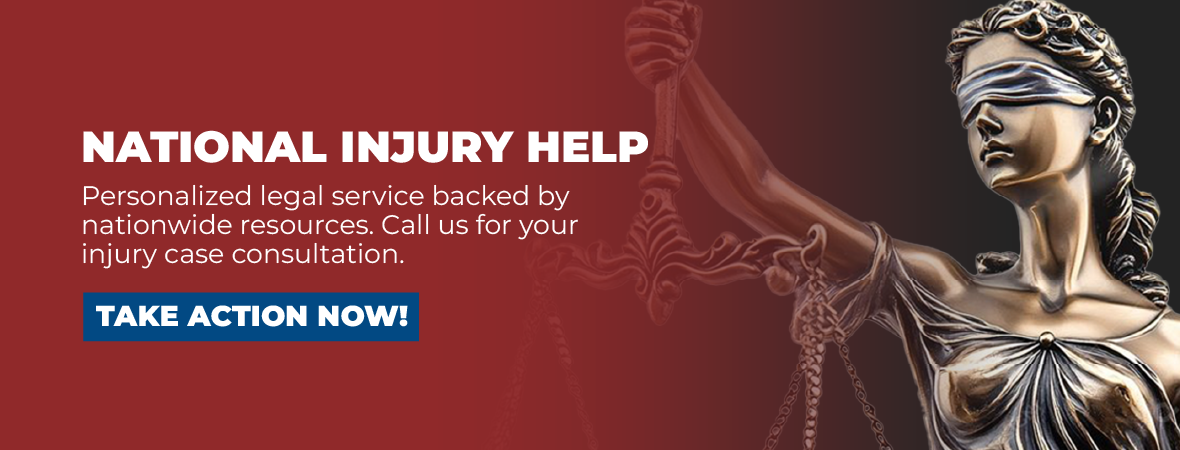There is a deadline for filing your injury claim. If you miss it, your case could be thrown out. This guide explains how long you have to act. Do not delay. Call National Injury Help today and let us make sure everything is filed on time and done right.
One of the questions we hear most often at National Injury Help is this: “How much time do I have to file a lawsuit after getting injured?” It’s a smart question, and one that can make or break your case. The answer depends on something called the statute of limitations, which is the legal time limit you have to take action after an accident or injury. Think of it like a countdown clock. The moment you’re hurt, the timer begins. And once it runs out, your right to seek compensation for medical bills, lost income, rehabilitation, emotional distress, and more may disappear completely, no matter how solid your evidence is.
That might sound strict, and it is. But these deadlines exist for a reason. Courts want to handle cases while the facts are still clear, witnesses still remember details, and documentation is still easy to collect. Waiting too long can blur the lines between what happened and what can be proven.
Still, knowing this rule exists is only half the story. The real challenge is that every state sets its time limits, and different types of injury claims follow different rules. That’s where things can get complicated.
That’s why taking early action is so important. Consulting a lawyer right away helps preserve your rights and gives your legal team the best chance to build a strong case. At National Injury Help, we’re here to help you make sense of the rules, meet every deadline, and focus on what matters most: your recovery. Let’s walk through the most common filing deadlines, when they apply, and how to make sure time doesn’t slip away before you get the justice you deserve.
General Personal Injury Statute of Limitations in Most States
Let’s take a look at some of the legal framework surrounding personal injury cases across the country.
Standard Time Frame
Many states give you two years from the day you were hurt to file a lawsuit. A few allow only one year, and some grant three, four, or even six years. Talking with an insurance adjuster or sending a demand letter does not stop the clock. The core rule covers:
- Car crashes on highways, neighborhood streets, or parking lots
- Slip-and-fall injuries in stores, hotels, or private homes
- Dog bites or other animal attacks due to the owner failing to control the animal
- Defective products that break, explode, or otherwise cause harm
When the Clock Starts Ticking
The countdown begins when the claim accrues, that is, when you knew or should have known you were injured.
- Most claims start on the accident date, the moment the vehicles collide or your foot hits a loose board.
- The discovery rule can delay the start. If a reasonable person could not have discovered the injury sooner, the clock begins later, but you must prove this with medical or technical evidence.
What Happens If You Miss the Filing Deadline
Courts enforce claim time limits strictly.
- Late cases are dismissed; judges rarely bend a rule set by law.
- Negotiation power vanishes; once the window closes, insurers know you cannot sue.
- Future problems stay unpaid; a closed window bars claims even if new complications appear later.
You should mark the end date as the day the accident happens and talk to a lawyer long before that date. Two years sounds long, yet serious injuries often mean months of treatment, and collecting every bill can take longer than you expect.
Special Cases with Different Time Limits
Lawmakers nationwide have created shorter or different clocks when certain defendants or injuries come into play. Knowing these exceptions may keep your case alive.
Claims Against Government Entities
Suing a public body, like a city transit agency, a county sheriff, or a state university, usually requires two fast steps:
- Notice of claim, often within 60180 days. You must send a written notice describing the facts, naming responsible employees, and stating the dollar amount you would accept. The wrong office ends the claim.
- Lawsuit within a shorter window, sometimes one year. Even if the agency never responds, you must still file before the deadline or lose your rights.
Because this timeline is tight and the rules are technical, families often hire counsel within days of the accident.
Medical Malpractice
Hospitals, clinics, and urgent-care centers generally follow the two-year rule, but discovery problems arise more often.
- The clock may start later: If a sponge is left inside you, the countdown begins when you knew or should have known about the error, not the surgery date.
- Expert affidavit: Many states require a sworn statement from a similar medical professional soon after filing, so gathering records quickly is wise.
Wrongful Death
When an injury turns fatal, a new clock starts.
- Two years from the date of death is common. Some states use one or three years.
- Who may sue: The surviving spouse, children, parents, or an estate representative can file a lawsuit, but only one lawsuit is allowed, so relatives should coordinate early.
Minors and Legally Incapacitated Persons
- Minors: The clock pauses until the child’s 18th birthday, then runs for the normal period.
- Incapacity: If an adult cannot handle legal affairs, the period pauses until a guardian is appointed or the person regains competence.
Tolling and Other Exceptions to the Statute of Limitations
A few facts can pause or extend the countdown. Lawyers call this tolling. Never rely on it without solid proof.
- Mental incompetence: Many states pause the statute until the victim regains competence or a guardian is named.
- Out-of-state defendants: Some statutes pause while the wrongdoer lives outside the state. Courts require proof of absence, and the clock can start and stop if the defendant returns.
- Fraud or concealment: Intentional hiding of negligence can pause the clock, but you must act with diligence once the facts surface.
- Military service or imprisonment: The deadline may be paused if the defendant is on active federal duty or imprisoned in another state and cannot be served.
These situations are rare, but every case is different, and only a careful review will reveal which clock applies.
Why You Shouldn’t Wait to File a Claim
Deadlines are only one reason to act quickly. Here are four more:
- Risk of Losing Crucial Evidence
Witness memories fade, cell-phone videos get deleted, and security cameras overwrite their own tapes, sometimes in seven days. Early action locks these pieces in place. - Insurance Company Delays
Adjusters know the calendar. Some stall, betting you will drift close to your deadline. Filing early removes that tactic and forces the insurer to focus on facts, not time. - Peace of Mind and Recovery
Legal stress can slow healing. Moving fast shifts the burden to your lawyer and frees your mind for therapy, rest, and family. - Lawyer Advantage
A prompt lawyer can:- Send preservation letters that stop businesses from erasing video
- Interview witnesses while the details are fresh
- Secure expert opinions before schedules fill up
- File before the deadline so your rights stay intact
Medical Bill Collections also matter. Hospitals may send unpaid balances to collections within months. Early filing can fund treatment, and lawyers can negotiate liens while bargaining with insurers.
Talk to a Personal Injury Attorney Today
We created this guide to help bring some clarity to the often confusing web of deadlines that surround personal injury claims in the United States. After an accident, it’s easy to feel overwhelmed. One moment you’re living your life, and the next, everything is disrupted: your health, your finances, your routine. On top of that, the legal system expects you to keep track of time-sensitive steps, forms, and filings. That’s a heavy burden when you’re already trying to recover physically and emotionally.
At National Injury Help, we understand what you’re going through, and we’re here to take that weight off your shoulders. If you’ve been injured and the clock is ticking, don’t wait any longer. Give us a call at 1 (800) 214-1010 and speak with someone who knows the ins and outs of personal injury law. We’ll walk you through the process, listen carefully to the details of your situation, and help you take the right legal steps before any deadlines put your case in jeopardy.
From the moment you reach out, we’ll start gathering the facts, requesting medical records, locating key witnesses, and ensuring that every necessary document is filed correctly and on time. The sooner we get started, the better we can protect your rights. Early action isn’t just smart, it can be the difference between a strong case and a missed opportunity. Memories fade, evidence disappears, and insurance companies move fast to protect their interests. You deserve someone who will move just as quickly for you.
There’s no risk in calling us. The consultation is completely free, and we only get paid if we win your case. Our team is available 24 hours a day to answer your questions in plain, easy-to-understand language, with no legal jargon or pressure, just real help when you need it most.








